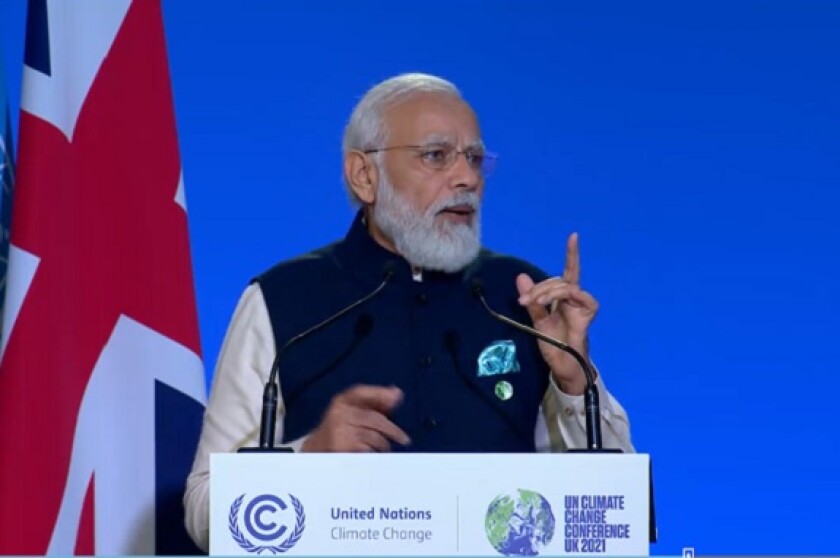Narendra Modi, India’s prime minister, took COP26 by surprise on Monday afternoon with a strong speech in which he for the first time committed India to reducing its greenhouse gas emissions to net zero. The target date of 2070 is much later than environmentalists want, but Modi made it clear he expected developed countries to greatly increase the climate finance they provide for developing nations.
During the plenary session of heads of state and government, which was streamed live online, Modi spoke for 12 minutes, much longer than most, and grasped the two central issues at stake in Glasgow — the pace of emissions cuts and how much help the rich countries that have done most to cause climate change will give the poor states that are the main sufferers from it.
In doing so he put the ball in the developed countries’ court to respond. Several including the UK, Germany, Italy and Sweden have already declared they will increase their climate finance, but the amounts still fall far short of what is needed and in some cases will only ramp up over several years.
These countries are still struggling to reach the target of $100bn a year of climate finance from developed to developing worlds, set in Copenhagen in 2009.
Angela Merkel, chancellor of Germany, admitted with regret in her speech on Monday that a study by Germany and Canada showed the target would be reached, but only in 2023.
Leeway on net zero target
In setting a 2070 date for India’s net zero target, Modi is likely to draw criticism from some quarters. There was disappointment a year ago when China said it would reach net zero in 2060, rather than 2050 as many developed countries including the US are aiming for.
In the past few days Saudi Arabia has set a 2060 target and Thailand one for 2065.
But India has long argued that as a developing country it should be given more leeway than nations that have built up their economies by burning coal since the 18th and 19th centuries.
After announcing India’s net zero target, something the country’s environment secretary RP Gupta had reportedly suggested would not happen as recently as last week, Modi addressed the developed world.
“Friends — all of us are aware of the reality that the promises made so far on climate finance have only proved to be hollow,” he said. “As we are all increasing our ambitions with respect to climate action, the world’s ambitions with regard to climate finance cannot be at the same level as they were during the Paris Agreement. Today India has resolved to move forward with new commitments and with a new energy. At such a time climate finance and the transfer of low cost climate technologies becomes even more important. India expects developed countries to make $1tr available as climate finance as soon as possible.”
He also alluded to talks set to take place in Glasgow on the rules for measuring climate action under the Paris Agreement, and the continuing lack of agreement on how to measure climate finance.
“Today as we track the progress on climate mitigation, in the same way we must also track climate finance,” Modi said. “Justice would truly be served if pressure is put on those countries that have not lived up to their climate finance commitments.”
Earlier in his speech, Modi had emphasised the importance of international co-operation, quoting a Hindu mantra which he said was all the more relevant in the 21st century — “we must all work together… everyone must get together and talk to each other… there should also be a meeting of the minds”.
He underlined India’s efforts so far, saying “today the entire world acknowledges that India is the only big economy in the world that has delivered both in letter and in spirit on its Paris commitments”.
Despite having 17% of the world’s population, India was responsible for only 5% of emissions, Modi said.
India was fourth in the world for renewable energy generating capacity, had increased non-fossil energy by 25% in the past seven years and now obtained 40% of its energy from non-fossil sources, he said.
“More people travel on the Indian railways every year than the entire population of the world,” Modi said. “This huge railway system has committed to net zero by 2030. This initiative alone will reduce carbon emissions by 60m tonnes annually.”
The country’s LED bulbs initiative would cut 40m from emissions.
For comparison, the UK emitted about 450m tonnes of greenhouse gases in 2019.
Modi made his own suggestion for a new movement — “LiFE”, meaning Lifestyle for Environment.
LiFE movement
“The world acknowledges that lifestyle plays a very important role in climate change,” he said. LiFE could “be given an institutional framework, it can become a mass movement for an environmentally conscious lifestyle. Today instead of mindless and destructive consumption we need mindful and deliberate utilisation.”
This movement could, he argued, “bring about revolutionary change” in industries from fishing, agriculture and tourism to housing and energy. “This is the only way to go from the welfare of the self to the welfare of all,” Modi said.
He then made five climate commitments, which he called “a gift of five elixirs” — the fifth being the net zero target.
The other four were targets for 2030: increasing non-fossil fuel energy to 500GW; deriving 50% of energy from renewable sources; reducing total projected carbon emissions by 1bn tonnes (presumably compared with the country’s current expected trajectory); and reducing the economy’s carbon intensity by 45%.
Modi finished by saying that “India understands and shares the pain of other developing countries and has consistently been vocal about their expectations. For many developing countries, climate change is a very big crisis looming before them — one that threatens their very existence.”





